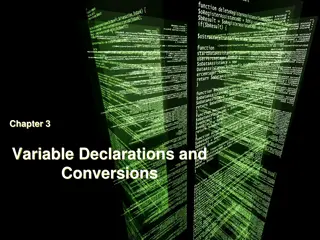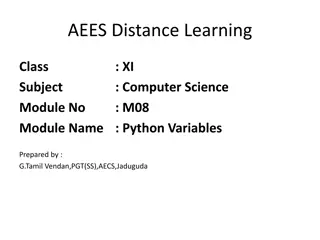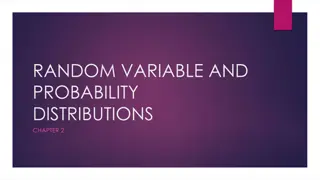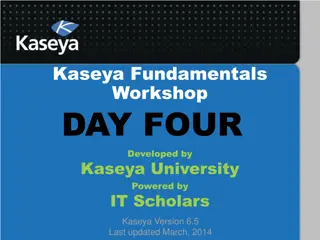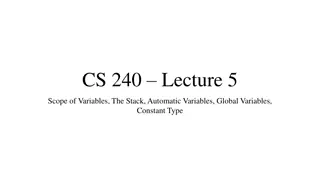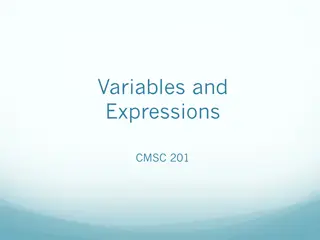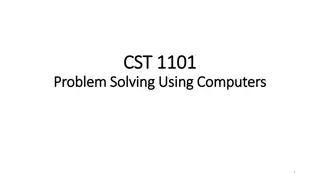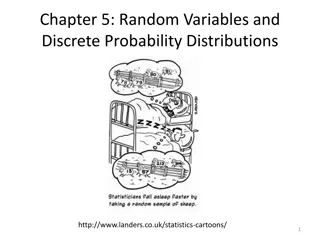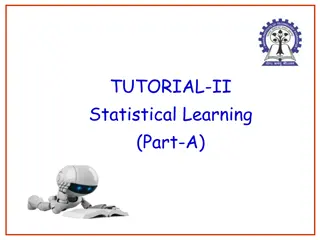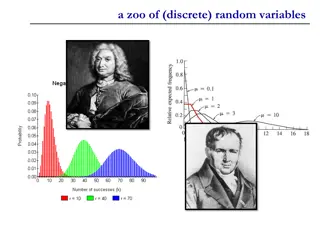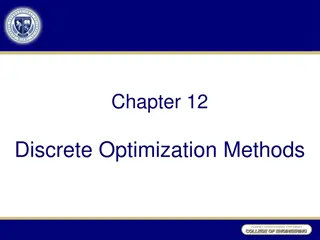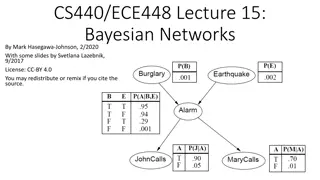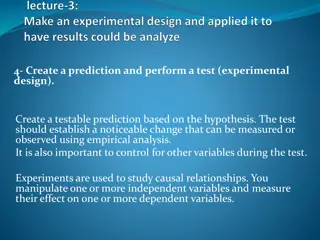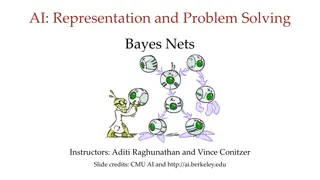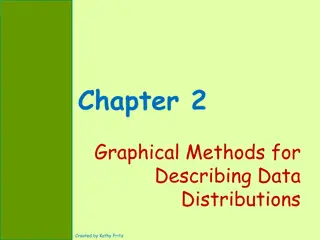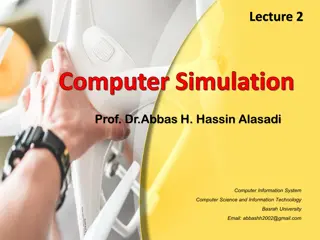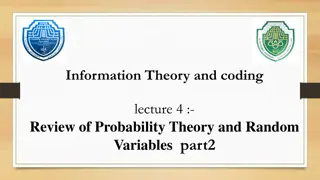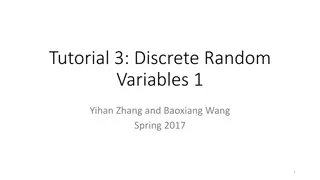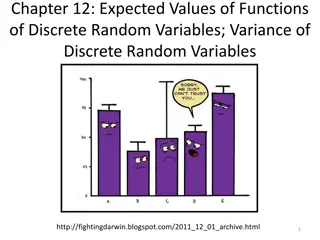Dummy Variables in Regression Analysis
Dummy variables are essential in regression analysis to quantify qualitative variables that influence the dependent variable. They represent attributes like gender, education level, or region with binary values (0 or 1). Econometricians use dummy variables as proxies for unmeasurable factors. These
3 views • 19 slides
Variables in Research Studies
Variables in research studies play crucial roles in examining relationships and drawing conclusions. They include independent variables that influence outcomes, dependent variables affected by independent ones, moderator variables that strengthen or weaken relationships, intervening variables lying
8 views • 34 slides
Variables and Control in Research Design
In research design, variables play crucial roles as either dependent or independent factors, with extraneous variables potentially affecting study outcomes. Controlling for extraneous variables is essential to attribute effects solely to the independent variables. Research hypotheses aim to test pre
1 views • 6 slides
Variable Declarations and Conversions in Java
Properly declaring variables in Java is essential before using them. This chapter covers different types of variable declarations, including class variables, instance variables, local variables, and parameter variables. It also explains the concept of type casting and the importance of explicitly de
1 views • 23 slides
Random Variables and Their Applications in Various Fields
Random variables play a crucial role in statistics, engineering, and business applications. They can be discrete or continuous, depending on the nature of the outcomes. Discrete random variables have countable values, while continuous random variables can take on any real number. This article explor
1 views • 6 slides
Discrete Optimization in Mathematical Modeling
Discrete Optimization is a field of applied mathematics that uses techniques from combinatorics, graph theory, linear programming, and algorithms to solve optimization problems over discrete structures. This involves creating mathematical models, defining objective functions, decision variables, and
2 views • 12 slides
Python Variables: Understanding Declaration, Naming Rules, and Assignment Operators
Python variables are essential for storing values in reserved memory locations. This article covers the basics of variables in Python, including declaration, assigning values, naming rules, multiple assignments, deleting variables, and assignment operators. Learn how to create, name, and manipulate
3 views • 11 slides
Variables in Educational Research
Variables in educational research play a crucial role as symbols of events, traits, or characteristics that can be measured and categorized. Different types of variables such as change, effect, and outcome variables are essential in studying causal relationships. Dependent variables represent outcom
7 views • 17 slides
Random Variables and Probability Distributions
Random variables are variables whose values are unknown and can be discrete or continuous. Probability distributions provide the likelihood of outcomes in a random experiment. Learn how random variables are used in quantifying outcomes and differentiating from algebraic variables. Explore types of r
2 views • 13 slides
Variables in Physics: A Comprehensive Guide
This presentation introduces and explains different types of variables in Physics, emphasizing the concepts of independent, dependent, and control variables. It provides practical examples and tips for identifying variables in experiments, aiming to enhance students' understanding of scientific meth
3 views • 24 slides
Discrete Probability Distributions
Explore the definition of random variables, probability distributions, and three types of discrete distributions - Binomial, Hypergeometric, and Poisson. Learn about the mean, variance, and standard deviation of probability distributions, as well as the difference between discrete and continuous dis
5 views • 32 slides
Kaseya Fundamentals Workshop - Agent Procedures and Variables Overview
Discover the key aspects of Agent Procedures and Variables in Kaseya Fundamentals Workshop, including Managed Variables, Global Variables, and Public Variables. Explore examples of Agent Procedures and learn about Application Deployment, Windows Registry Modification, and more. Gain insights into Pr
1 views • 23 slides
Memory Stack and Variable Scope in Computer Architecture
This content delves into the scope of variables, the stack in memory architecture, automatic and global variables, and the concept of constant types. It explains the functioning of the stack, how function calls are managed, and the allocation of variables within stack frames. The relationship betwee
1 views • 18 slides
Variables in Programming
Variables in programming act as containers to store information. They are essential in languages like Scratch to hold values. Computers use labels to identify variables, and values stored inside can be accessed by reading the labels. Programming utilizes commands like "var" to define variables and s
2 views • 23 slides
Predicates and Quantifiers in Discrete Mathematics
Introduction to predicates and quantifiers in discrete mathematics, highlighting their importance in expressing statements involving variables beyond propositional logic. Predicates define properties that variables can have, and quantifiers help in making statements about all or some elements in a d
1 views • 125 slides
Introduction to Variables and Expressions in Python
Today we start Python! Learn about variables, how to create them, assign values, and perform mathematical operations using variables in Python. Understand the rules for naming variables and how they are essential for storing and managing information in your programs. Explore different types of varia
2 views • 16 slides
Variables in Programming and Memory Concepts
Variables are essential in programming as they allow temporary storage of data within a program. This content delves into the concept of variables, their importance, and how they function in memory. It explains the relationship between variable names and memory locations, discusses data types, and h
0 views • 19 slides
Variables in Economics
Variables in economics, such as dependent, independent, endogenous, and exogenous variables, play a crucial role in analyzing economic phenomena. Dependent variables are influenced by changes in other variables, while independent variables are not. Endogenous variables are internal and need to be pr
2 views • 8 slides
Random Variables and Probability Distributions
Explore the concept of random variables, differentiate between discrete and continuous variables, understand probability distributions, and calculate probabilities for events using properties of random variables. Dive into examples and probability histograms to grasp key principles.
0 views • 39 slides
The Art of Variables in Programming and Delicious Sandwiches
Explore the concept of variables in programming using fun analogies of creating a PBJ sandwich and a s'more. Understand how variables act as containers to store important information in code. Discover the ingredients needed for each delicious treat and learn how variables play a crucial role in both
1 views • 5 slides
Discrete Random Variables and Variance Relationships
Explore the concepts of independence in random variables, shifting variances, and facts about variance in the context of discrete random variables. Learn about key relationships such as Var(X + Y) = Var(X) + Var(Y) and discover common patterns in the Discrete Random Variable Zoo. Embrace the goal of
1 views • 27 slides
Statistical Learning: Discrete Random Variables and Distributions
Explore the concepts related to discrete random variables and their corresponding probability density functions, such as Poisson Distribution and Binomial Distribution. Understand the implications of negative values in random variables, calculate expected values, and grasp the relationships between
1 views • 16 slides
A Zoo of Discrete Random Variables
Discrete random variables play a crucial role in probability theory and statistics. This content explores three key types: Bernoulli random variable, binomial random variable, and error-correcting codes. From understanding the basics of Bernoulli trials to exploring the application of error correcti
0 views • 27 slides
Discrete Optimization Methods Overview
Discrete optimization methods, such as total enumeration and constraint relaxations, are valuable techniques for solving problems with discrete decision variables. Total enumeration involves exhaustively trying all possibilities to find optimal solutions, while constraint relaxations offer a more tr
0 views • 80 slides
Bayesian Networks for Efficient Probabilistic Inference
Bayesian networks, also known as graphical models, provide a compact and efficient way to represent complex joint probability distributions involving hidden variables. By depicting conditional independence relationships between random variables in a graph, Bayesian networks facilitate Bayesian infer
0 views • 33 slides
Designing a Controlled Experiment: Steps and Considerations
Experimental design involves systematically testing hypotheses by manipulating independent variables and measuring their effects on dependent variables. This process includes considering variables, designing treatments, assigning subjects to groups, and planning measurements. To ensure valid conclus
0 views • 11 slides
Global and Local Variables in Programming
Global and local variables play essential roles in programming. Global variables can be accessed by all functions within a program, while local variables are restricted to specific functions. This text explains the concepts with analogies and code examples to illustrate how variables are scoped in p
0 views • 8 slides
AI: Representation and Problem Solving
This comprehensive course covers topics such as Classical Planning, Propositional Logic, Markov Decision Processes (MDPs), Reinforcement Learning (RL), Bayes Nets, and more. Mid-terms, homework deadlines, and key concepts are highlighted. Explore Bayes nets and delve into Omega Pizzeria probability
0 views • 51 slides
Graphical Methods for Data Distributions
In this chapter, Kathy Fritz presents graphical methods for describing data distributions. It covers variables, data types (univariate, bivariate, multivariate), categorical and numerical variables, and their characteristics. Understand the distinctions between different types of data and variables,
0 views • 70 slides
Natural Sciences Grade 7
Variables play a crucial role in scientific investigations as they are the elements that change and are measured during experiments. There are two main types of variables - dependent and independent. Dependent variables respond to changes in independent variables, which are manipulated by the experi
0 views • 8 slides
Introduction to Discrete Mathematics Course
Discrete Mathematics MACM 101 taught by Binay Bhattacharya covers important themes, goals, and syllabus information. The course includes lectures on Mondays, Wednesdays, and Fridays with additional office hours available for students. Topics like Continuous vs. Discrete Mathematics are explored, emp
0 views • 26 slides
Computer Simulation Models Classification
Computer simulation models are classified based on various characteristics such as static or dynamic, deterministic or stochastic, and discrete or continuous. Static models represent systems at a specific point in time, while dynamic models depict changes over time. Deterministic models involve no r
0 views • 8 slides
Understanding Discrete Optimization in Graph Theory
Explore the relationship between counting techniques, graph theory, and discrete optimization, with examples illustrating the transition from counting problems to optimization problems. Learn about applying optimization in scheduling and making graph models, as well as the role of graphs in discrete
2 views • 8 slides
Coding Lecture 4: Review of Probability Theory and Random Variables
In this lecture, you will review probability theory, random variables, binary symmetric channels, types of random variables (discrete and continuous), and probability density functions. Understand the concepts with examples and learn about noisy channels. Explore the probabilities associated with di
0 views • 8 slides
Understanding Probability: Discrete vs. Continuous Variables
Explore the key differences between discrete and continuous random variables in probability theory. Learn how to calculate probabilities for both types of variables and determine the mean. Understand the concepts through examples like shooting free throws in basketball.
0 views • 21 slides
Discrete Random Variables and Associated Probability Functions
Explore the concept of discrete random variables, their associated probability mass functions, and examples of typical discrete random variables like the Binomial and Poisson random variables. Understand the difference between discrete and continuous random variables with practical examples.
0 views • 19 slides
Understanding Probability Distributions and Expectations in Statistics
Explore the concepts of probability distributions, including PMF, PDF, expectation, and variance for both discrete and continuous random variables. Learn about linearity of expectation and the calculation of expectations for uniform random numbers. Dive into the comparison between discrete and conti
0 views • 28 slides
Mastering Discrete Random Variables in CSE 312 Summer 21 Lecture
Explore the world of discrete random variables in CSE 312 Summer 21 Lecture, covering topics such as variance, shifting variables, common distributions, and more. Understand key concepts and problem-solving strategies to excel in your studies.
0 views • 42 slides
Discrete Mathematics: Validity, Inference Rules, Consistency, and Set Theory
Explore the foundational concepts of discrete mathematics, including theory of inference, rules of inference, consistency of premises, statement functions, variables, quantifiers, free and bound variables, set theory, functions, and composition of functions. Delve into the logical reasoning behind s
0 views • 21 slides
Understanding Expected Values and Variance in Discrete Random Variables
Explore the concepts of expected values and variance in discrete random variables through examples involving functions and scenarios like automobile insurance and bus students. Learn how to calculate expected values and variances, and understand their properties.
0 views • 6 slides



